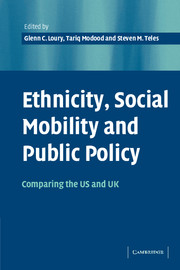Book contents
- Frontmatter
- Contents
- List of figures
- List of tables
- List of contributors
- Acknowledgements
- Introduction
- Part I Historical overviews
- Part II Informal social networks
- Part III Formal structures
- Part IV Political institutions and processes
- Part V Normative analysis
- 20 Race, inequality and justice in the USA: some social-philosophic reflections
- 21 Achieving racial equality
- Author index
- Subject index
- References
20 - Race, inequality and justice in the USA: some social-philosophic reflections
Published online by Cambridge University Press: 22 September 2009
- Frontmatter
- Contents
- List of figures
- List of tables
- List of contributors
- Acknowledgements
- Introduction
- Part I Historical overviews
- Part II Informal social networks
- Part III Formal structures
- Part IV Political institutions and processes
- Part V Normative analysis
- 20 Race, inequality and justice in the USA: some social-philosophic reflections
- 21 Achieving racial equality
- Author index
- Subject index
- References
Summary
Introduction
The concerns of this essay are normative and conceptual. Seven generations after the end of slavery, and a half-century past the dawn of the civil rights movement, social life in the United States is still characterized by a significant degree of racial stratification and inequality. Numerous indices of well-being – wages, unemployment rates, income and wealth levels, ability test scores, incarceration and criminal victimization rates, health and mortality statistics – all reveal substantial disparity among different racial groups. Indeed, over the past quarter-century the black–white gap along some of these dimensions has remained unchanged, or even widened. Although there has been noteworthy progress in reversing historical patterns of racial subordination, there is today no scientific basis upon which to rest the prediction that a rough parity of socioeconomic status between blacks and whites in the USA will obtain in the foreseeable future.
“So what?” one might reasonably ask. As long as the individual members of a disadvantaged racial minority group are not being discriminated against, why should citizens in the United States, or in any liberal democracy for that matter, care about racial inequality per se? This is an important question for anyone reflecting on matters of social justice in a pluralistic society. It is especially crucial for adherents of political liberalism, who hold that a properly structured analysis of the justness of social arrangements should derive from a consideration of the welfare of individuals, and not from the economic or social position of population subgroups.
- Type
- Chapter
- Information
- Ethnicity, Social Mobility, and Public PolicyComparing the USA and UK, pp. 573 - 601Publisher: Cambridge University PressPrint publication year: 2005
References
- 2
- Cited by



